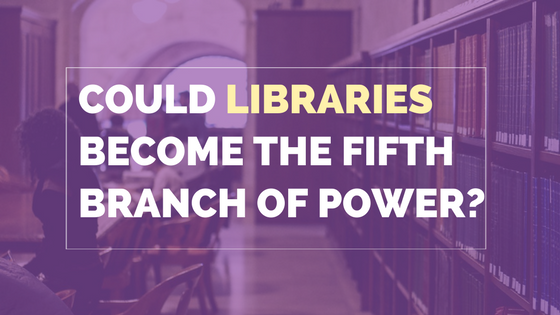The role of libraries in connection to the fake news phenomenon has been intensely debated in the last year as libraries are gaining more confidence than most media outlets.
Fake news has always existed but given the recent outburst of unverified and in some cases untrue news in the press, libraries have started positioning themselves as a fake news debunker.
Libraries as fake news debunker
International library organizations such as IFLA and CILIP took initiative and created different calls to action for libraries to start educating the citizens in spotting fake news.
IFLA took its inspiration from FactCheck.org’s 2016 article How to Spot Fake News and created a visual representation of it with eight simple steps to discover the verifiability of a given news-piece in front of you. It can be easily downloaded in different formats and languages so make your pick!
CILIP launched a campaign called ‘#FactsMatter’ that ran at the same time with the 2017 General Election campaign advocating for the vital role of facts and evidence in public life.
The #library 's offerings have the purpose of ensuring the necessary skills for spotting fake news. Share on XLocal libraries have taken the initiatives even further as they have started focusing more on offering workshops, talks, educational materials, quizzes or courses on topics such as literacy, critical thinking, digital skills, etc. All of these offerings have the purpose of ensuring the necessary skills for spotting fake news.

“How to spot fake news” IFLA campaign
Libraries as a trustworthy source of information
At the same time, the confidence in media is decreasing and the importance of libraries is more crucial now than ever.
The Pew Research Center recently released a report on American people’s engagement with information. The survey results interestingly show that people are aware of all the misinformation existing online and even around them and they would appreciate having institutions helping them gain confidence in their digital and information literacy skills.
The confidence in #media is decreasing and the importance of #libraries is more crucial now than ever. Share on XIn connection to this, an older report also shows that more than 70% of respondents feel that public libraries help them find information that is trustworthy and reliable and help them learn new things.
Therefore, the library is the best source for reliable and trustworthy information and it is gaining more confidence than most media outlets.

How People Approach Facts and Information Pew Research Center Report
Libraries as the Fifth Branch of Power
Libraries are becoming a key player in ensuring that the right and correct information reaches the citizens. Altinget, an independent online newspaper in Denmark recently published a discussion with Steen Bording Andersen, Chairman of the Danish Library Association. In this article, Andersen presents and supports the idea that libraries should take the role of the fifth branch of government since the press and the internet are failing.
#libraries should become the 5th branch of power since the press and the internet are failing. Share on XHe bases his affirmation on several reasons with the most important being the need for a “control mechanism since the press and the internet no longer are in control”. He considers libraries the best choice because they have a “long-term popular education tradition” and they are a trusted source of information by 94% of the Danish population.
Furthermore, another interesting fact Andersen emphasizes is that libraries can’t be controlled or dependent on the government, like the press. He states:
“No. In fact, we have plenty of examples that libraries face the local government. I absolutely do not experience the libraries being controlled by anyone. And it does not control the citizens either. People believe they receive neutral information from the libraries. ”
The whole interview can be found here in Danish.
Indeed, the library situation in Denmark is a fortunate one as libraries have the support of the government while being more autonomous at the same time.
Even so, could libraries become the fifth branch of power?
Share your views with us in the comments!
Did you like this? Help us spread the word. Find us on social media via Facebook or Twitter and read the latest developments in libraries from around the world.
Recent posts
Green Libraries: How Sustainable Design is Shaping the Future of Public Libraries
In this week's Princh Library Blog post, recurring guest writer Sam L. Bowman discusses an ever so important topic: sustainable design and [...]
Librarians Supporting Digital Literacy in the Community
In this week's Princh Library Blog, Nina Grant covers why digital literacy is important, the variety of ways in which librarians are supporting [...]




[…] Could Libraries Become The Fifth Branch Of Power? | Princh Blog. The role of libraries in connection to the fake news phenomenon has been intensely debated in the last year as libraries are gaining more confidence than most media outlets. Fake news has always existed but given the recent outburst of unverified and in some cases untrue news in the press, libraries have started positioning themselves as a fake news debunker. […]
Although I strongly agree that libraries should be positioning themselves as an authority, even “the” authority, on the validity of news sources, I don’t believe it warrants us being the 5th estate. For one thing, I think it is false to say that the press and internet are no longer in control. They were never “in control.” Perhaps an argument could be made for the press, but never the internet! Also, if the press were in control, it wouldn’t be the press but rather propaganda and a mere extension of some other political entity (either the one in power or that which is trying to get into power).
Secondly, to say that “libraries can’t be controlled or dependent on the government” is a nice idea, but also wrong. Libraries serve “at the pleasure” of their local communities and can/are influenced by them, as such. Libraries are usually dependent on local and state financial support.
Thirdly, we can’t – and shouldn’t- think we can replace journalists. I’ve often noted how similar the work is between librarians and the press. Looking for information and facts. However, there is one huge difference. Both professions may be seeking the truth, but only journalism can claim that as their actual mandate. Librarians may locate information, but our obligation has been to provide it for all possible perspectives. We have always considered identifying the right viewpoint or conclusion or truth as the 3rd rail. However, as we are no longer needed to be the gatekeepers for information (because of it’s ubiquity) we could be useful in the role of a concierge.
So, while we can’t claim to know the truth, neither can we deny our ability – and responsibility – to help guide people toward truthful sources. It is a fine line to walk but we need to do it.
[…] باشد. نقل به مضمون از https://en.wikipedia.org/wiki/Fifth_power (مترجم) [۲] https://princh.com/could-libraries-become-the-fifth-branch-of-power/#.Wf2r74-CyM9 [۳] IFLA [۴] CILIP [۵] https://www.ifla.org/publications/node/11174 [۶] Altinget [۷] Steen […]
[…] Kudos to Mindy and every visionary librarian for taking our libraries to the next level, keeping them vital and valid through residents’ involvement and design thinking. Their vision is helping lead the way for libraries to become the Fifth Branch of Power. […]